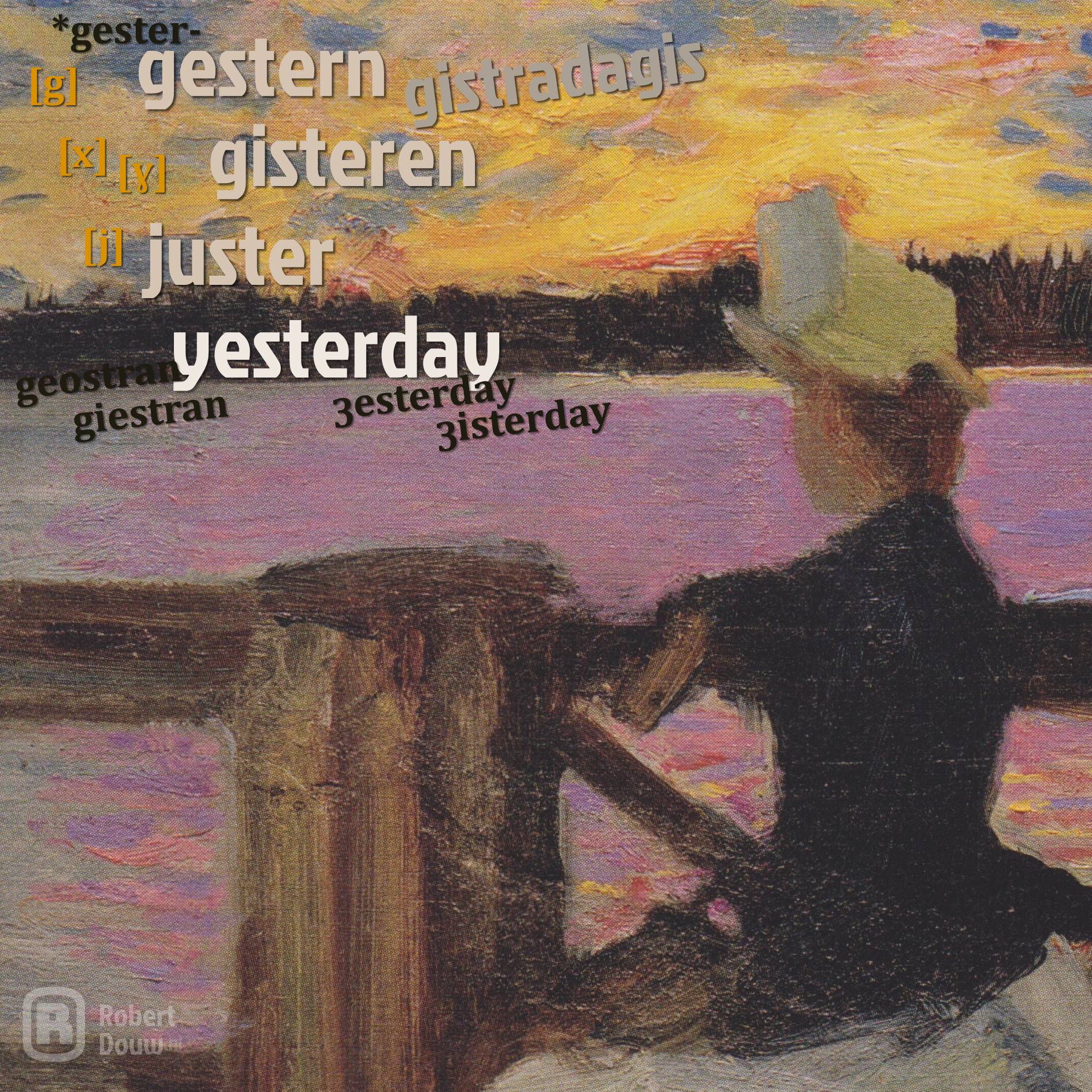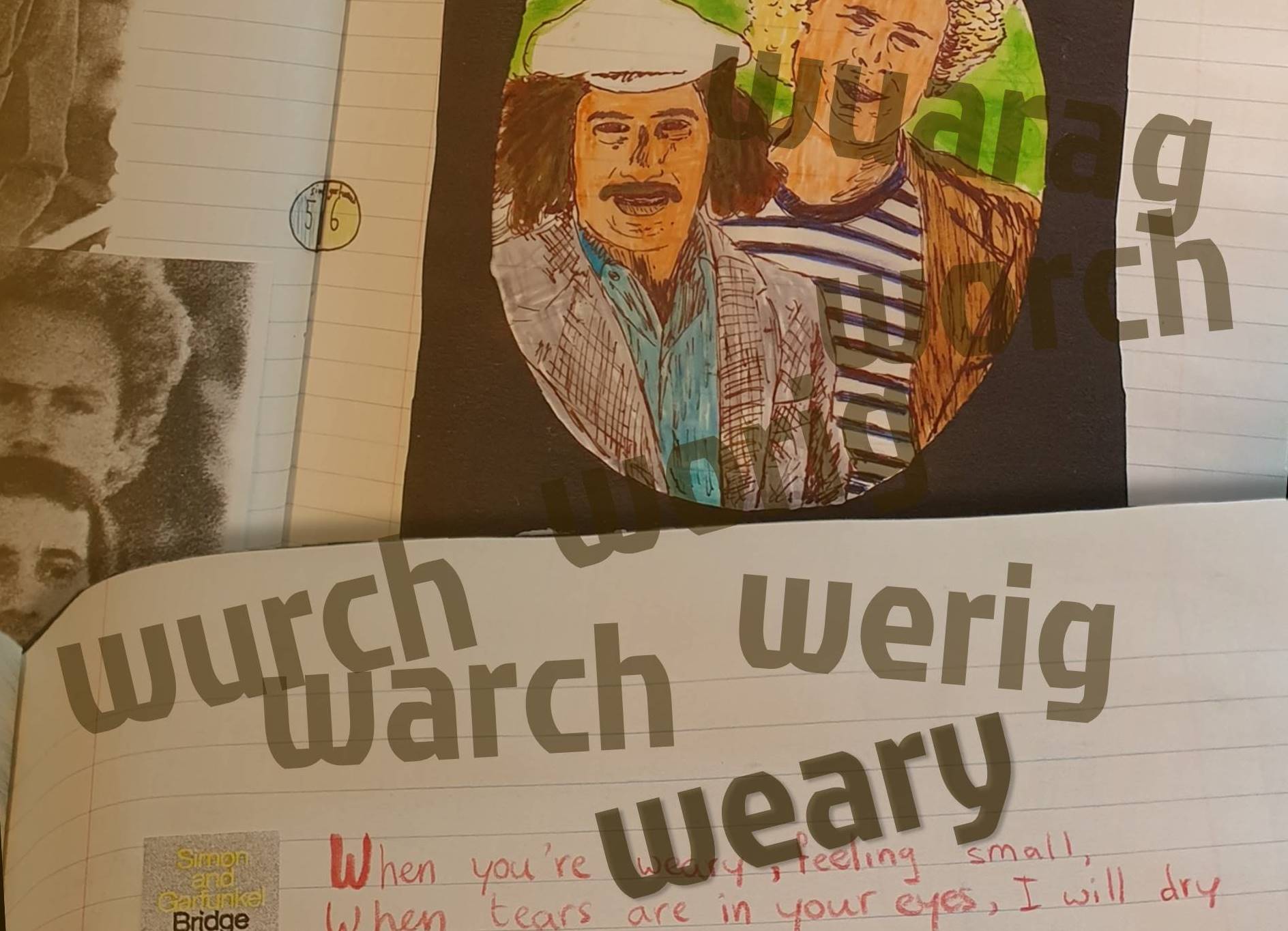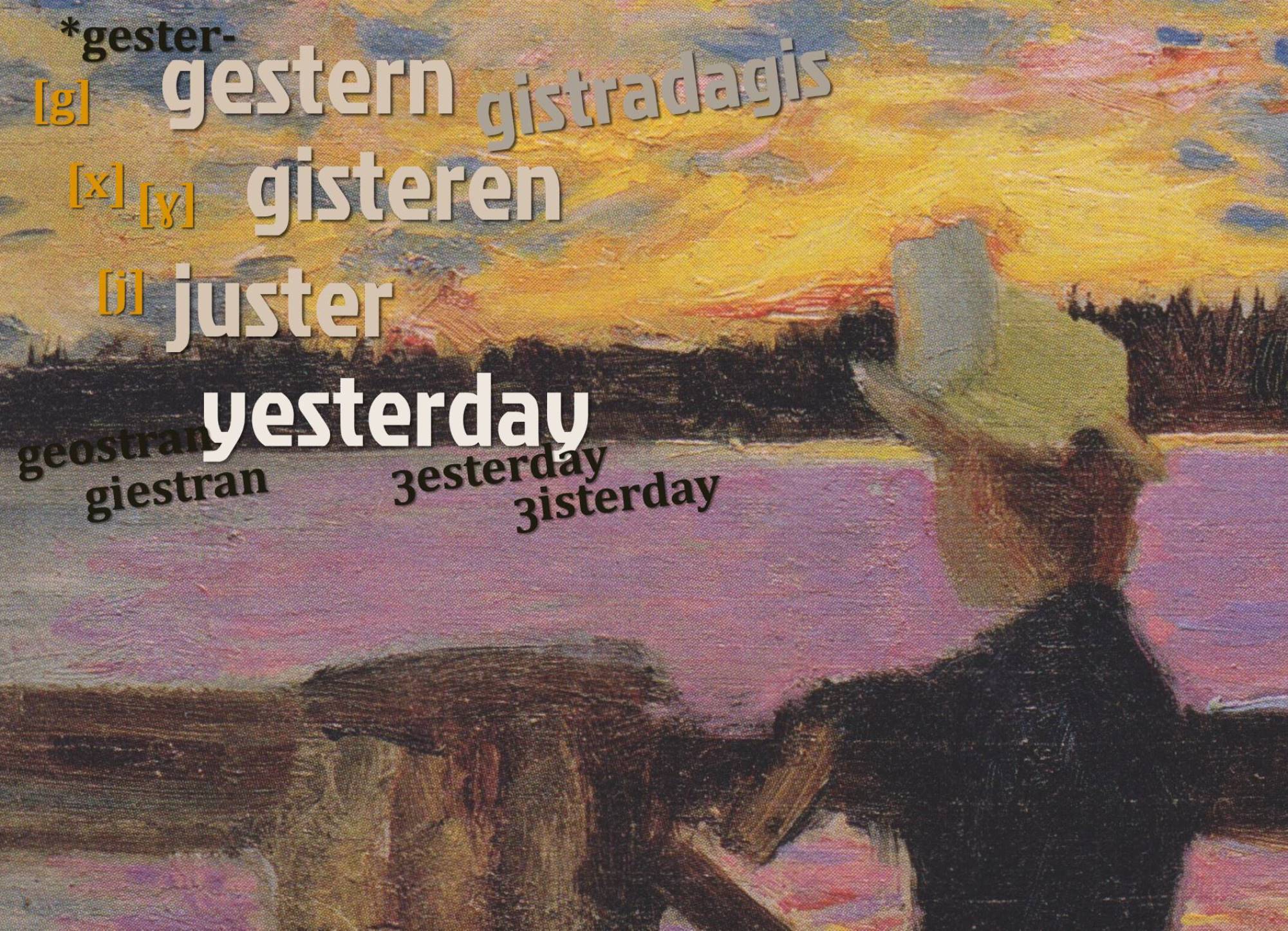WEST GERMANIC
Yesterday
Linguistics
| 15-09-2021
Chances are you now have a Beatles song in your head (…all my troubles seemed so far away…) either in the original version or in one of the over 2000 cover versions (…now it looks as though they're here to stay…). However, I now stay at that first word, and wonder why it isn't yestern, like in German, or yesteren like in Dutch. And how come there is a "j" sound at the beginning, and not a "g" sound.
yester- + day
It's clear at first sight that there is a relationship between yesterday in English, gestern in German, gisteren in Dutch and juster in Frisian. However, it is also clear that there are a few striking differences: in addition to the opening sound, this is of course the lack of -tag, -dag and -dei in comparison with yesterday. In an earlier piece I briefly discussed the Old English word for day, dæg, and looking up the etymology of yesterday I come across that word again. The only thing the Online Etymology Dictionary mentions under yesterday is “Old English geostran dæg; see yester- + day”. I have not been able to find out why the English do put -day behind it.

Opening sounds
The word part yester-, which as far as I have been able to find has never been an independent word in English, can be traced back to the Old English geostran, which seems to have independently had the meaning "yesterday". Another Old English form is giestran, which already looks more like gisteren, although in English there will have been the same initial sound as German gestern (in the phonetic script the [g], where the Dutch 'scraping' g-sound is written as [x] and the softer "Southern Dutch variant" as [ɣ]). A Dictionary of the Older Scottish Tongue lists the words ȝisterday and ȝesterday, with the first letter being the yogh.
The letter yogh
The yogh is a new letter to me – great, such discoveries! – and if I am to believe the English Wikipedia, that letter was used in Middle English and Old Scots to represent various sounds, including the [g], the [x], the [ɣ] and the [j]. In other words: if you read ȝesterday, you could pronounce it as "jesterday", but also as "gesterday". The Proto-Germanic predecessor of yester- was *gester-, so I suspect the initial sound originally was the [g], as in German gestern. In Dutch that was then changed into an [x] or [ɣ], in Frisian into a [j]. Whether the English took the word with a [j] sound from Frisian, or with a [g] sound from German or Proto-Germanic and then weakened it to a [j] I dare not say.
Before or after today?
Enough about sounds (for now), because I also want to go into the meaning of yester-, juster, gisteren and gestern. All those words (and other variants, such as gister and gister’n in Dutch) mean "on the day before today". This was not the case originally, however, which can be clearly seen from the Gothic word gistradagis. Or actually you can't see it at all, because that word looks so much like yesterday – and it's almost Dutch: *gisterdags – that you would think it has the same meaning, but that is not the case: gistradagis means "tomorrow", which is off course the day after today.
Tomorrow came later
The original meaning of the Proto-Germanic *gester- was "another day, seen from today". And since from today's point of view you can go back in time as well as forward, the meaning could be either "the day before today" or "the day after today". The word tomorrow only came into existence in Middle English, the word morgen only in Middle Dutch and moarn much later, in New Frisian. Only in German it is not entirely clear when Morgen got the meaning "the next day" in addition to "morning"; that could have been already in Old High German. So, even though I have not come across anything that states this, it could well be that the English, Frisian, Dutch and German derivatives of *gester- were once used in both senses, just as in Gothic. In that case, in the Beatles song you should have inferred from the next sentence that they meant the day before today.
yester- + day
It's clear at first sight that there is a relationship between yesterday in English, gestern in German, gisteren in Dutch and juster in Frisian. However, it is also clear that there are a few striking differences: in addition to the opening sound, this is of course the lack of -tag, -dag and -dei in comparison with yesterday. In an earlier piece I briefly discussed the Old English word for day, dæg, and looking up the etymology of yesterday I come across that word again. The only thing the Online Etymology Dictionary mentions under yesterday is “Old English geostran dæg; see yester- + day”. I have not been able to find out why the English do put -day behind it.

Opening sounds
The word part yester-, which as far as I have been able to find has never been an independent word in English, can be traced back to the Old English geostran, which seems to have independently had the meaning "yesterday". Another Old English form is giestran, which already looks more like gisteren, although in English there will have been the same initial sound as German gestern (in the phonetic script the [g], where the Dutch 'scraping' g-sound is written as [x] and the softer "Southern Dutch variant" as [ɣ]). A Dictionary of the Older Scottish Tongue lists the words ȝisterday and ȝesterday, with the first letter being the yogh.
The letter yogh
The yogh is a new letter to me – great, such discoveries! – and if I am to believe the English Wikipedia, that letter was used in Middle English and Old Scots to represent various sounds, including the [g], the [x], the [ɣ] and the [j]. In other words: if you read ȝesterday, you could pronounce it as "jesterday", but also as "gesterday". The Proto-Germanic predecessor of yester- was *gester-, so I suspect the initial sound originally was the [g], as in German gestern. In Dutch that was then changed into an [x] or [ɣ], in Frisian into a [j]. Whether the English took the word with a [j] sound from Frisian, or with a [g] sound from German or Proto-Germanic and then weakened it to a [j] I dare not say.
Before or after today?
Enough about sounds (for now), because I also want to go into the meaning of yester-, juster, gisteren and gestern. All those words (and other variants, such as gister and gister’n in Dutch) mean "on the day before today". This was not the case originally, however, which can be clearly seen from the Gothic word gistradagis. Or actually you can't see it at all, because that word looks so much like yesterday – and it's almost Dutch: *gisterdags – that you would think it has the same meaning, but that is not the case: gistradagis means "tomorrow", which is off course the day after today.
Tomorrow came later
The original meaning of the Proto-Germanic *gester- was "another day, seen from today". And since from today's point of view you can go back in time as well as forward, the meaning could be either "the day before today" or "the day after today". The word tomorrow only came into existence in Middle English, the word morgen only in Middle Dutch and moarn much later, in New Frisian. Only in German it is not entirely clear when Morgen got the meaning "the next day" in addition to "morning"; that could have been already in Old High German. So, even though I have not come across anything that states this, it could well be that the English, Frisian, Dutch and German derivatives of *gester- were once used in both senses, just as in Gothic. In that case, in the Beatles song you should have inferred from the next sentence that they meant the day before today.

WEST GERMANIC
Nijsgjirrich

WEST GERMANIC
When you're weary
LINGUISTICS
Click here for an overview of everything in the Linguistics section.
